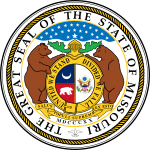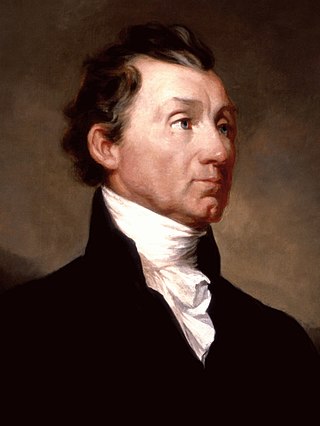
The 1820 United States presidential election was the ninth quadrennial presidential election. It was held from Wednesday, November 1, to Wednesday, December 6, 1820. Taking place at the height of the Era of Good Feelings, the election saw incumbent Democratic-Republican President James Monroe win re-election without a major opponent. It was the third and the most recent United States presidential election in which a presidential candidate ran effectively unopposed. As of 2024, this is the most recent presidential election where an incumbent president was re-elected who was neither a Democrat nor a Republican, before the Democratic-Republican party split into separate parties. James Monroe's re-election marked the first time in U.S. history that a third consecutive president won a second election. This happened again with Barack Obama's re-election in the 2012 election and at no other point have multiple consecutive presidents won two elections.
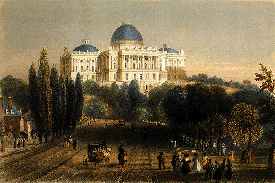
The 16th United States Congress was a meeting of the legislative branch of the United States federal government, consisting of the United States Senate and the United States House of Representatives. It met in Washington, D.C. from March 4, 1819, to March 4, 1821, during the third and fourth years of James Monroe's presidency. The apportionment of seats in the House of Representatives was based on the 1810 United States census. Both chambers had a Democratic-Republican majority.

The 17th United States Congress was a meeting of the legislative branch of the United States federal government, consisting of the United States Senate and the United States House of Representatives. While its term was officially March 4, 1821, to March 4, 1823, during the fifth and sixth years of James Monroe's presidency, its first session began on December 3, 1821, ending on May 8, 1822, and its second session began on December 2, 1822, to March 3, 1823. The apportionment of seats in the House of Representatives was based on the 1810 United States census. Both chambers had a Democratic-Republican majority.

The 1822–23 United States House of Representatives elections were held on various dates in various states between July 1, 1822, and August 14, 1823. Each state set its own date for its elections to the House of Representatives before the first session of the 18th United States Congress convened on December 1, 1823. They occurred during President James Monroe's second term.
The 1820–21 United States House of Representatives elections were held on various dates in various states between July 3, 1820, and August 10, 1821. Each state set its own date for its elections to the House of Representatives before the first session of the 17th United States Congress convened on December 3, 1821. They coincided with President James Monroe winning reelection unopposed.
Mark Langdon Hill was United States Representative from Massachusetts and from Maine. He was born in Biddeford on June 30, 1772. He attended the public schools, then became a merchant and shipbuilder in Phippsburg. He was an overseer and trustee of Bowdoin College. He is the nephew of John Langdon. New Hampshire governor, Senator and patriot.

Ezekiel Whitman was a Representative from Maine, both when it was the District of Maine within Massachusetts and after it became an independent state. He was born in East Bridgewater in the Province of Massachusetts Bay on March 9, 1776. He graduated from Brown University in 1795. He studied law, was admitted to the bar and practiced in New Gloucester, Maine, and in Portland, Maine.
Thomas Butler was an American politician and lawyer who served in the United States House of Representatives from 1818 to 1821, representing the at-large congressional district of Louisiana as a member of the Democratic-Republican Party.
Martin Kinsley was a U.S. Representative from Massachusetts. Born in Bridgewater in the Province of Massachusetts Bay, Kinsley graduated from Harvard College in 1778. He studied medicine. He became a purveyor of supplies in the Revolutionary Army. He served as Treasurer of the Town of Hardwick. He moved to Hampden, and was a representative of that town in the Massachusetts House of Representatives. He served as member of the executive council in 1810 and 1811, as a judge of the court of common pleas in 1811, as judge of the probate court, and served in the Massachusetts State Senate.
Peter Sharpe was an American politician who served as a United States representative from New York.

The 1820 United States presidential election in Missouri took place between November 1 to December 6, 1820. The Missouri state legislature chose 3 electors, who voted for president and vice president. Missouri Territory was formed just after Louisiana was admitted to fill the old space of the Louisiana Purchase. In 1820, they split off a portion of Missouri Territory into what would become the new state of Missouri. However, the heated debate had begun after Congress could not decide whether its electoral votes in the upcoming election would count, or if it should be rejected and would vote in 1824. This debate would later be overshadowed with issues regarding the expansion of slavery out west, and whether Missouri would be a free or slave state. Eventually, the Missouri Compromise allowed Missouri to be a slave state, however, they could not admit any more states above a line marked by the new Arkansaw Territory.
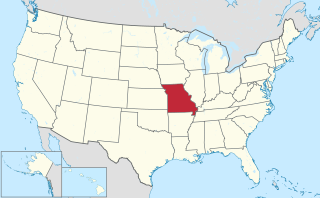
The tables below list the United States presidential elections in Missouri, ordered by year. Since 1904, Missouri has voted for the eventual winner of the presidential election with only four exceptions: 1956, 2008, 2012, and 2020. Missouri was historically viewed as a bellwether state, but the consecutive votes against the winning candidate in 2008 and 2012 introduced doubts about its continued status as a bellwether, and an 18.5-point Republican victory in 2016 indicated that it had become a safe red state.
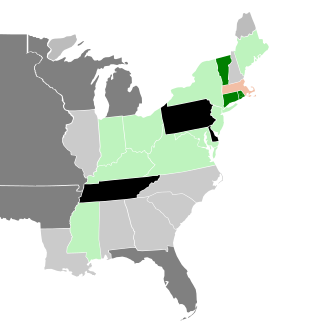
The 1820–21 United States Senate elections were held on various dates in various states, corresponding with James Monroe's landslide re-election. As these U.S. Senate elections were prior to the ratification of the Seventeenth Amendment in 1913, senators were chosen by state legislatures. Senators were elected over a wide range of time throughout 1820 and 1821, and a seat may have been filled months late or remained vacant due to legislative deadlock. In these elections, terms were up for the senators in Class 1.

Kentucky elected its members August 7, 1820.

Maryland elected its members October 2, 1820.

The 1820–1821 United States Senate election in Pennsylvania was held on three separate dates from December 1820 to December 1821. On December 10, 1821, William Findlay was elected by the Pennsylvania General Assembly to the United States Senate.

On May 15, 1820, David Fullerton (DR) of Pennsylvania's 5th district resigned from his seat in the House of Representatives. A special election was held on October 10, 1820 to fill the resulting vacancy. This election was held on the same day as the election for the 17th Congress.

This was the first election in Maine since its separation from Massachusetts. In the previous election, Massachusetts had had 20 representatives. Seven seats were reassigned from Massachusetts to Maine. In addition, under the terms of the law which admitted Maine to the union, any vacancies in the 16th Congress by Representatives elected to represent Massachusetts but residing in the new states of Maine would be filled by a resident of Maine. John Holmes, who had been elected to the House for the former 14th district of Massachusetts was elected as one of the first two senators for Maine. The vacancy was filled in a special election by Joseph Dane (Federalist). Dane was the only Representative officially considered as representing Maine in the 16th Congress. The Representatives from the 15th-20th districts were still classified as being from Massachusetts for the remainder of the 16th Congress.

Rhode Island elected its members August 29, 1820.
